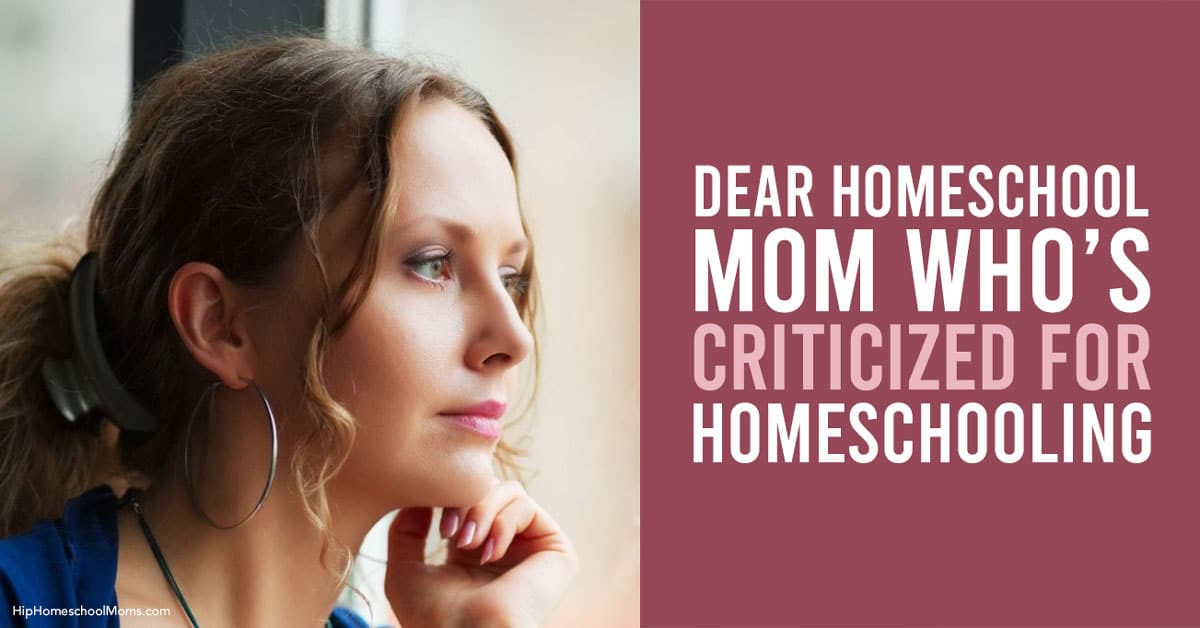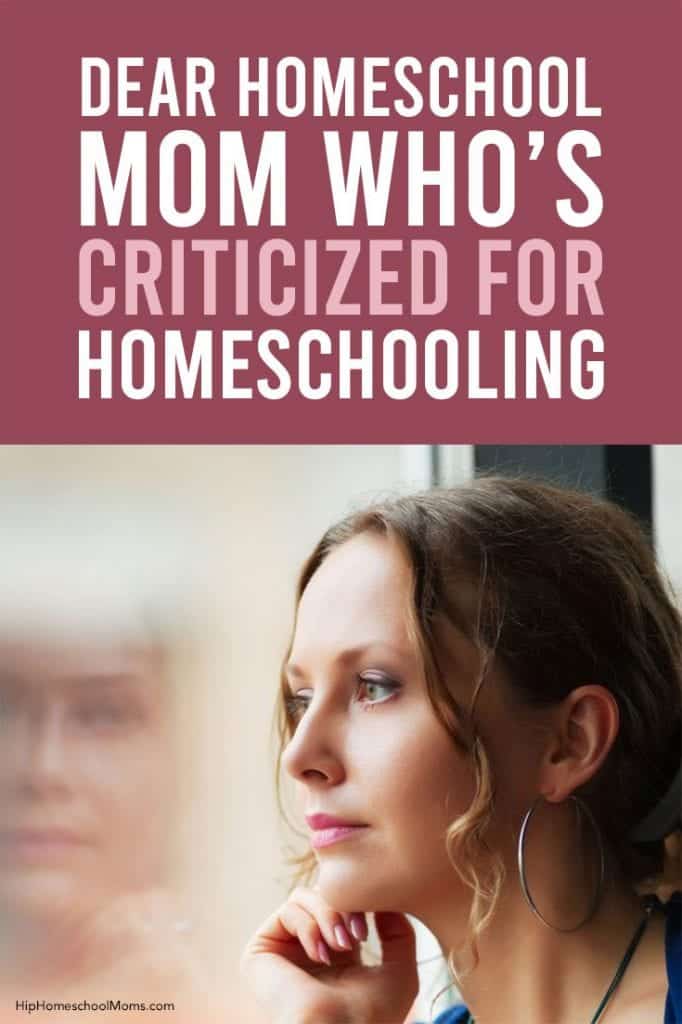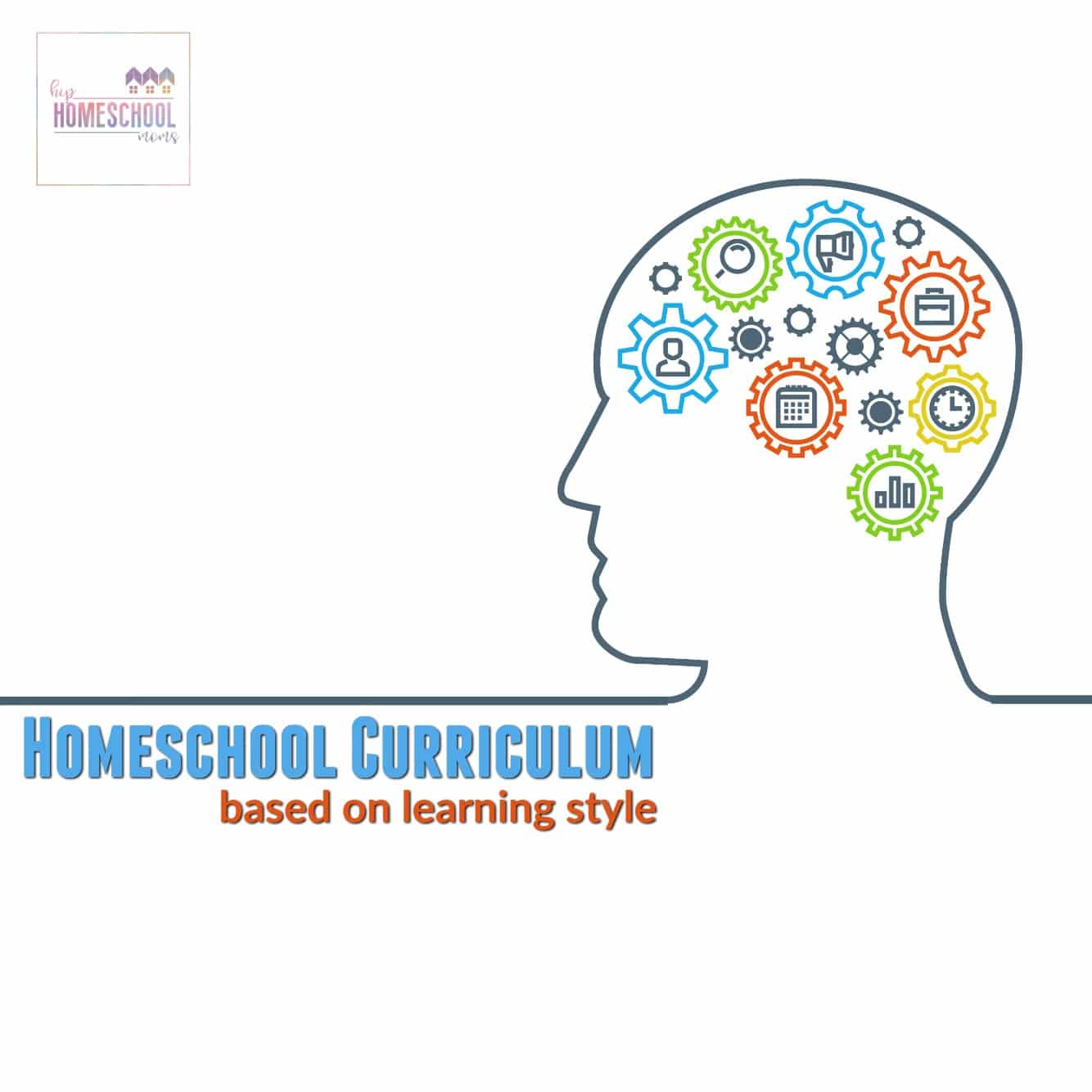Dear Homeschool Mom Who’s Criticized for Homeschooling (10 Helpful Tips)
I hear from many homeschool moms who are openly ridiculed by friends or relatives for choosing to homeschool. Others may not be ridiculed, but instead, they are put on the spot and asked questions like, “How do you know you’re doing a good job teaching your children? What if they aren’t learning what they need to learn? How would you even know?” Some people say things like, “I think it’s sad that your children don’t get to go to school like ‘normal’ children. Don’t you want your children to have friends?”
If YOU have encountered similar statements, I hope you’ll keep reading because this article is for you!

So what can you do if you find yourself in this situation? Or what if you’ve already been there and done that and want to be better prepared next time? Here are a few suggestions. (I would love to have your suggestions too! If you have ideas for constructive ways to handle this, please share in the comments below!)
1. Remember that people who are critical of homeschooling are (usually) simply uninformed!
First of all, I’d like to say that, even though it’s very hard not to feel belittled, unsure, or just plain angry when friends and relatives (and sometimes even total strangers!) make these comments and ask these questions, remember that most people who are critical of homeschooling are simply uninformed. They honestly have no idea what a wonderful educational option homeschooling really is!
No, it’s not polite for them to bring it up in a negative or accusatory manner; that’s true. But instead of responding the same way, be aware that often, they are coming from a place of simply not knowing about homeschooling. (and some of these suggestions will be helpful to you in informing them, so keep reading!)
2. Keep in mind that sometimes–not always–those who criticize us for homeschooling are a little bit envious.
They may know that homeschooling is a really great option, but they may be too afraid to step out there and give it a try. Or maybe they think they can’t do it for financial reasons. Or perhaps they mistakenly feel like we look down on them for sending their children to school. They might mistake our enthusiasm for feelings of superiority. Keeping this possibility in mind may make it easier for you to respond in a positive, information-sharing way.
3. Impossible as it may seem, try not to get angry.
Reacting with anger, or being defensive, causes the other person to feel like we have something to hide. Maintaining quiet confidence goes a long way toward letting that person know that you’re certain you’re doing what’s best for your children. And to tell the truth, reacting kindly may also make the other person, whether she admits it or not, less likely to be so confrontational next time. Many people just feel silly when they gear up for a fight and don’t get one.
4. Give that person some information about homeschooling and how effective it really is!
There is a lot of research that gives statistics and information that clearly show how well homeschooled students perform in college, in their communities, and in their jobs as adults. But many people simply don’t realize this!
Copy and paste the links to some excellent research studies and give them to the critics so they can see the research for themselves. (I’ll leave links toward the end of this article.) Just be sure to offer in a kind way so they’ll know you really mean well. (If the critical person refuses to accept the information you offer, you’ll know he/she isn’t truly interested in whether or not homeschooling is effective but instead just wants to pick a fight. In that case, you should give yourself permission not to worry about that person’s opinion!)
5. Be confident that you’ve made the right choice for your own family.
If you don’t feel confident that you’re doing what’s best for your children, it will be very easy to become worried and upset when others criticize or question you. It might be good for you to spend a little time reading these articles (referenced below) to build up your own confidence and become better informed about the benefits of homeschooling.
Once you truly feel great about your decision, it will be much harder for others to cause you to question your reasons for homeschooling or your ability to homeschool.
6. Know that it doesn’t matter if you have a college education or not. Research shows that simply having a desire and willingness to teach your children helps ensure that your kids will be well educated.
There is plenty of research showing that it makes very little difference in a child’s academic performance whether the homeschool teacher has a college degree or not. It’s just a fact. It turns out that having a keen interest in the student’s (your child’s) performance is much more important than having a college degree. Not to mention the low student-to-teacher ratio and the ability to choose or adapt curriculum to fit your child’s specific needs. It only makes sense that homeschooled students would be well-educated under these circumstances!
7. Even though it sounds very simple, it might help to teach your children how to respond for themselves when questioned by adults and what school they attend.
My children are older now, but when they were younger, when asked where they went to school, they often answered, “Oh, we don’t go to school!” When an adult hears that statement, he or she almost certainly thinks, Those children aren’t being taught anything! They just said they don’t go to school! I realized that that wasn’t a good way to begin a conversation, so I taught my children to simply say, “We go to Hilton Christian Academy.” Often, there were no more questions after that. If someone asked where the school was located, I simply joined in and said, “That’s the name of our homeschool.” For some reason, simply having a name for our school seemed to cause others to feel it was a more legitimate schooling option. (In my state, we don’t have to have an official name for our homeschool, but we gave it this unofficial name for our own purposes.)
8. Speak positively about your homeschool to your children and others whenever possible.
If your children hear you saying positive things about your homeschool, they will be more likely to do the same. When grandparents and other relatives hear you and your children saying good things about your homeschool, it makes it that much harder for them to be critical.
9. Get your husband on board if possible.
Unfortunately, some folks will criticize and question the mom about homeschooling but would never do such a thing to the dad. If your husband is willing, have a signal that lets him know you need him to come to your rescue! Talk with him ahead of time (if you’re going to a family gathering and know ahead of time that this might be an issue) and have your signal and his responses ready. (I sometimes text message my hubby if I need to be rescued–even if he’s just across the room. That way I can communicate with him privately and don’t have to worry about being overheard.)
If you’ve already spoken with the critic and haven’t been able to make any headway, you may simply need your husband to say that he supports your efforts and that the two of you agreed together that homeschooling is best for your children and that the conversation is now over. If your husband won’t come to your rescue, you may have to agree to disagree with the critic (see suggestion #10 below) and simply state that the conversation is now over.
10. If all else fails, agree to disagree.
If you have a friend or relative who just won’t stop being critical or negative about homeschooling, you may have to speak to him or her in a very honest way and simply say something like, “When you criticize our homeschool, you’re not just hurting me; you’re also hurting my children. Our homeschool is important to them and to me, and being critical not only hurts our feelings, but it also tears down the pride that my children have in our school and in their academic achievement. I understand that you don’t agree that homeschooling is the right thing for us to do, but I don’t need your permission to make this decision for my children. Let’s please agree to disagree on this and simply not discuss it anymore. If you can’t agree to this, then we’ll have to limit our time together. I don’t want to do that, but I will if I have to.”
Ideally, we would never find ourselves in these kinds of situations. If and when it does happen, though, it’s always best to be prepared to kindly and accurately respond to the critic(s). I hope the articles referenced below will be of help to you!
Also, if you have any kind suggestions for dealing with such a situation, please share in the comments!

For easy reference, I’m including links to some articles and studies that you may find helpful.
Socialization:
When folks have questions about homeschooling and socialization, read this article showing that socialization is not a problem for homeschoolers. In fact, most homeschoolers know how to get along with children (and adults) of all ages instead of just same-age peers.
Comparisons:
When people want to know how homeschoolers compare to students who attend public school, read this article showing how American homeschoolers measure up.
You May Also Like:
Are You Worried About Homeschooling and Socialization?

Helping Your Children Develop Good Study Skills











I sort of laugh when I read these articles…I *WISH* only those things were said to us! We were accused of psychologically traumatizing our children, of social isolation, and of not embracing the family value of education and independent thinking. Then we were told we were being anti family. It is not a good feeling to have to take your children to the doctor to have them “psychologically” evaluated for documentation in the event that your mother in law turns you in. Several years later, though, when she needed us to care for her, and we had no choice but to homeschool at her dining room table…with therapists coming in and out and singing the praises of our socially well adjusted delightful children (read: making her look good) did she do a 180. As far as how to respond? Agreed with this post. Try not to be hurt and angry…likely as not it just an untactful approach to expressing concerns.
When I got frustrated with the schools, my wife said I adapted sort of a homeschooling with a little “h.” We took the kids to plays, science fairs, book fairs, some interesting travel. We did our own little informal home schooling. I liked this observation she made and use it quite a bit when this issue comes up. I think home schooling is very much a continuum; most parents do it to one degree or another. After a while, if you are serious about learning, it just kind of becomes a big “H” naturally. I find it very effective.
My kids answer “We don’t go to school” .. I’ve corrected them so much and now they are beginning to say “We are homeschooled”. I tend to just change the subject and avoid it.
I have heard numerous people saying that socialization really isn’t a concern for homeschoolers. While I realize this is often true in many cases, I would like to add that in other cases, it truly IS a concern. For those whose kiddos have special needs, for those who live in rural areas or neighborhoods without other kids ( or very few kids, kids who are unruly and not good influences / very negative influences,) those who are unable to afford extracurricular activities or who are not allowed to participate in those activities because of not being in the public school, etc.– discovering friends for their children really may be next to impossible! For example, we live in a rural area. There are no other homeschoolers in our town, and the closest around us are 20 miles away. One of them has kids who are kindergarten and younger, while our kids are upper elementary and older. Yes they have played together and yes our kids have done well interacting with them, but it’s really not the same as having friends who are similar in age with similar interests, capabilities, etc. 20 miles the other direction are two other homeschool families, but one has no interest in getting together and the other has a very full schedule– willing to get together, but not often. There is literally only one other homeschool family, besides those two and us, in our entire county! As for public school kids, most of them come from either single parent homes or homes where both parents work full time or more– and typically they are also from blended families, where kids are going to visit one parent or the other on weekends. During the week they usually have sports practice after school and then homework, and sports games on the weekends. So in all reality, if you aren’t on the sports team with them, there is almost no opportunity to spend tiem with them. There are a couple of community sports teams for elementary aged kids, but once you hit Jr High and High School, you have to be in the public school at least part time to do sports. Boy Scouts, once a week after school library program, and 4H are the ONLY other activities offered here– and because it’s a rural area with not many kids, it’s basically the same kids who are in all the activities. In other words, joining an activity doesn’t give you a chance to meet new kids– you are still with the same kids you are with in any other activity– so if you don’t form a close friendship with the kids at 4H, you can’t try a different activity to meet new kids. We do get together with a homeschool group, but it is 1 1/2 hours away– and there is only one other homeschool group that meets regularly around here, also 1 1/2 hours away and in a different state. (There is one about 1` hour away, but it is only for high schoolers and usually only meets to do an academic class together, not to socialize.) I just wanted to let people know that although many homeschool kids do have opportunities to join in a wide variety of activities and meet a wide variety of people, SOME literally do NOT have that chance. For some kids, homeschooling does have the potential to be lonely!
Unfortunately, I know many students who go to public or private school who have few if any friends and who don’t get together for sports or clubs or social events, etc. The fact that a child sits in a classroom all day really doesn’t mean that a child has friends or is benefiting socially–although that is commonly believed. Also, I have to disagree that socialization should be a concern for those who have special needs kids. I have a severely autistic child and another who has Asperger’s (both of whom are adults now and have graduated from our homeschool), and both of them had wonderful homeschool experiences! In fact, my daughter (who is now 23 years old) attended public school for a few years because I (mistakenly) believed that the school system would be better equipped to teach her than I would. While she did have some good experiences there, she had many more negative experiences than positive ones, and I would absolutely NOT send her to public school again if I had it to do over again. I think it’s safe to say that ANY child in ANY academic setting has the potential to be lonely. But most homeschooling families are great about getting creative and spending the time and effort necessary to provide plenty of social opportunities for our children.
I know this is an old comment, but I was homeschooled in a rural area. My brother is special needs. We are Christian and many of the people there were not, so it was hard to connect with people. There was no one my age at church. I didn’t have any close friends during my teens years. But I did have parents who loved me. I had siblings and more time with them than kids who are separated from their brothers and sisters due to grade level. I spent more time with my parents which included running errands where I got to meet all sorts of people. The flexibility in my schedule due to homeschool made it easier for me to get a job where I worked with people of all ages and walks of life. I helped with the little kids Sunday school at church. I learned how to interact with anyone from 0-100 yrs old. I and my siblings have zero regrets. I’m homeschooling my oldest now. Studies show that because of the variety of social interaction homeschoolers receive, they are more socially adjusted than their traditionally schooled peers, not less. The thing is, if you openly complain that your children don’t have many peer interactions, they’ll think it’s important. But if you put the emphasis on family, they’ll realize that’s what’s important. As a side note, I studied education at college and got to see what a real elementary classroom was like. The only time most schools let kids hold actual conversations is recess, which they don’t necessarily get in the older grades. Two minutes max of talk time between subjects and at lunch is not real social interaction.